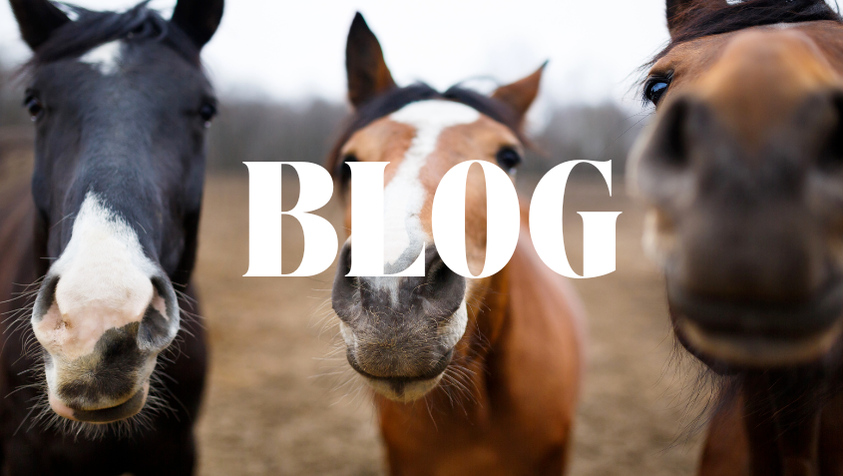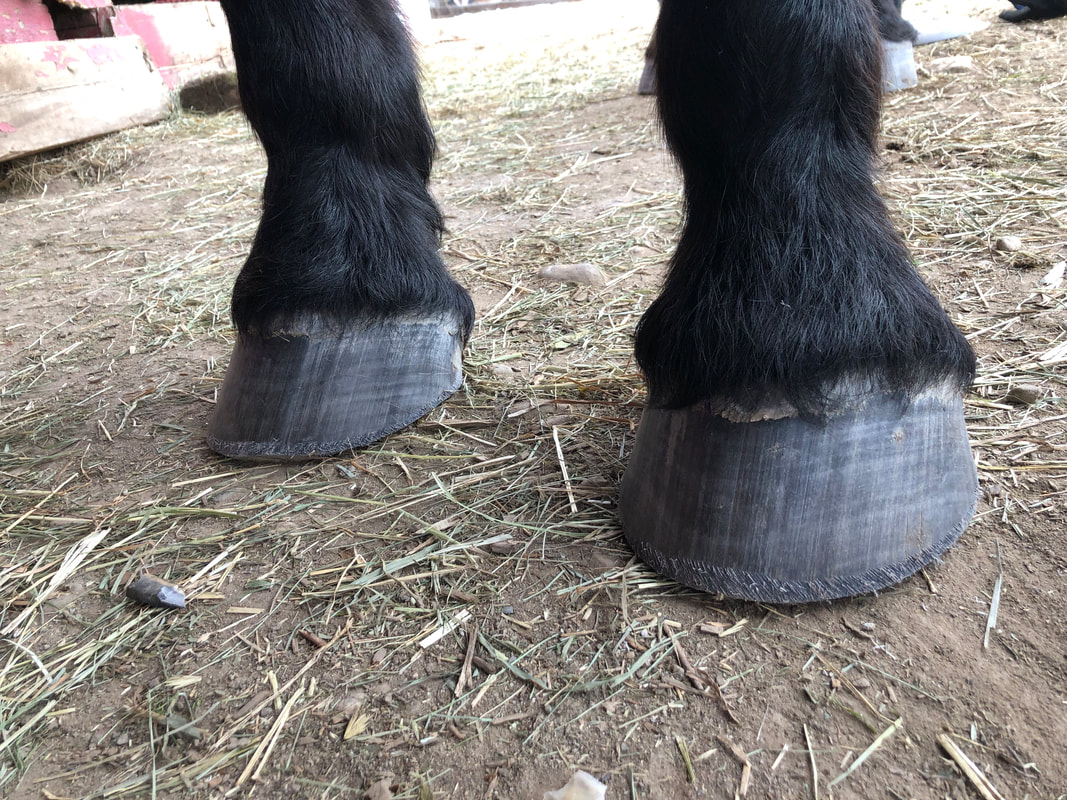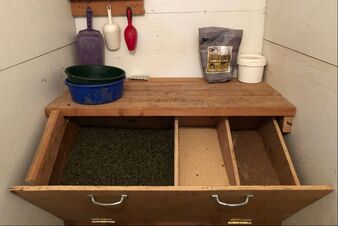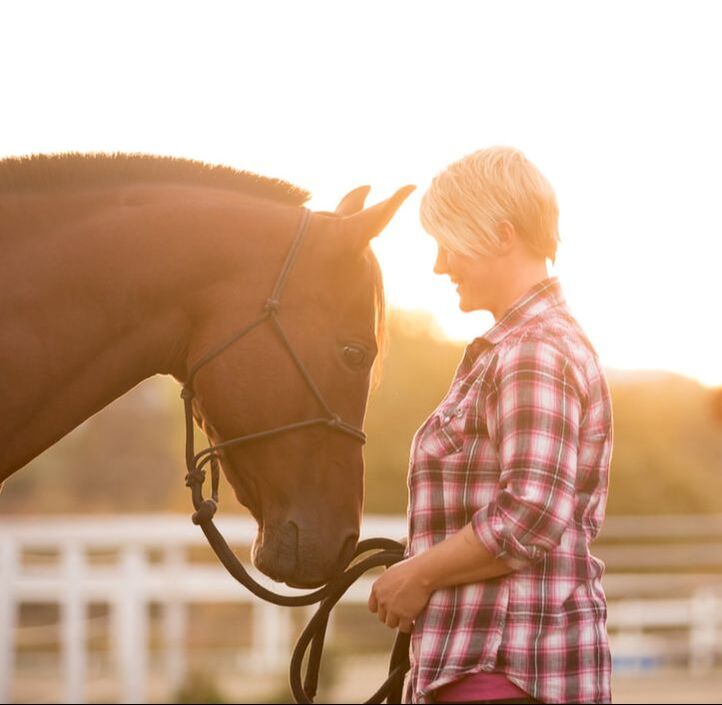|
Hooves are made of fibrous structural proteins called keratin on the outside and soft tissue surrounding the coffin bone on the inside. Keratin is a protein chain built of amino acids, I briefly discussed this in my previous blog post. So it makes sense then that if we need to develop stronger hooves or rehabilitate hooves its these amino acids that we should look to balance first. A horse that is deficient in proteins will usually have dry and brittle hooves. This is not to be confused with dry desert hooves, I am not talking about the moisture content on the outside of the hoof, but more specifically the texture of the hoof material when it is cut into. Dry or brittle hoof will have a hard and non elastic feel when it is rasped or nipped off. A healthy hoof will have a little bit if a spring to it when it is cut, it is more flexible due to the cellular makeup when those proteins are binding and forming the keratin. I see these dry and brittle hooves in conjunction with horses that may have an underdeveloped top line and/or a poor hair coat. All of these symptoms can be due to a lack of amino acids or proteins. I am currently undergoing a series of supplement trials with several of my own horses as well as some client horses. I have seen big changes in the horses that had dry and brittle hooves with very little elasticity when we started to supplement more proteins. These trials are purely for my own research, they are not scientific and are based purely on my observations of the hoof health and overall appearance of the horses. Feed trial #1 is a group of horses that have been fed alfalfa pellets, biotin and a mineral supplement for the past 6 weeks. Nothing else has changed for the horses such as living environment or hay source. Their hooves have gone from very dry and rigid with a brittle feel when cut to much more elastic and resilient feel. These horses also tended to be a bit tender on hard ground with a thin sole and that is improving as well. I am interested to see if the progress plateaus at some point, which would signal that perhaps the protein deficiency has been restored, or perhaps the absorption of the protein has diminished. Research has shown that it can take up to 2 years to replenish a protein deficiency in horses so this is a long term trial for me. We also have to take into account the supplementation of minerals to help bind these amino acids as well as the digestive system health of the horse which would affect the absorption rate of the supplemented proteins exponentially. Perhaps a horse could be fed the appropriate amount and varieties of amino acids but due to poor gut health could not absorb them. In this case feeding more proteins may well help with the deficiency, but instead restoring optimal gut health via pre and pro biotics may be more effective. Feed trial #2 is a group of horses with the same dry and brittle feel to their hooves and they are receiving a daily hoof health supplement that is toted as an all in one solution that contains all of the needed proteins, minerals and vitamins for the horse. After only 4 weeks on this feed trial I am seeing incremental changes in the hooves, but the results are less improved as in feed trail #1, more time is needed to study this regimen. Feed trial #3 is a group of horses that don't have any major outward issues with their hooves. They don't have the dry brittle hoof texture, and have a relatively healthy looking hair coat, however they do show a slight amount of muscle wastage in the top line. They have been fed a hay source high in alfalfa, and have been supplemented with a free choice mineral supplement for approximately 8 weeks. Results have varied among the horses but the ones with more muscle wastage have have improved slightly, while the ones with a lesser degree of muscle wastage have stayed the same. One area where this herd has improved is the incidence of minor thrush in the hoof. In spite of the wet weather due to the season change, these horses hooves appear to be more resistant to developing thrush and have overall healthier frogs then what I was previously seeing in their hooves. I have several other trials going on with single horses or smaller groups of horses. For me it is very interesting to see the effects of various supplements and what they can do for horses. I am specifically trying to target the hooves, but because horses are so interconnected you really have to address the digestive system as well in order to be sure that what you are supplementing is being properly absorbed. Please take this information for what is is, simply my own thoughts and musings regarding hoof health and supplementation. There are many other things that can and sometimes should be supplemented, for instance omega fatty acids and vitamin e, however you should speak with your veterinarian or equine nutritionist to see what you should specifically be supplementing for your horse. One thing that stands out to me is a conversation I had with a veterinarian a few years back. She said that whatever you are supplementing your horse with should provide a result. Whether that is an improved appearance, health, attitude, emotional state or physical change, there should be some evidence that it is doing something. Otherwise you are likely just feeding something that is passing right through and wasting money you could have spent on something beneficial to your horse. Often you don't know if what you are doing is working until you stop feeding it, sometimes this is where you will see the change either for the good or for the bad. I'm not saying stop feeding supplements or that you must feed x,y and z. I'm just saying know what you are supplementing and why. You know your horse better then anyone else and you can discuss their hoof health with your hoof care provider or your veterinarian and make an informed decision about what supplements might be beneficial for them.
1 Comment
I like to take care of my health, both physical and mental. To avoid deficiencies, I had to adopt a balanced diet and above all use a specific food supplement. It is on this article that I found the product that allowed me to relive and enjoy optimal well-being without health concerns.
Reply
Leave a Reply. |
AuthorKristi Luehr is a barefoot trimmer/farrier, author, and founder of the Okanagan School of Natural Hoof Care. She is certified by the Canadian Farrier School as well as the Oregon School of Natural Hoof Care, and also has certification in equine massage and dentistry. Her focus is to educate owners about hoof anatomy, function and proper barefoot trimming that supports and grows healthy and functional hooves specific to each horse's individual needs. She is the author of three online courses specific to hoof care and is always striving to create more educational content for students to learn from. Archives
May 2024
|




 RSS Feed
RSS Feed
